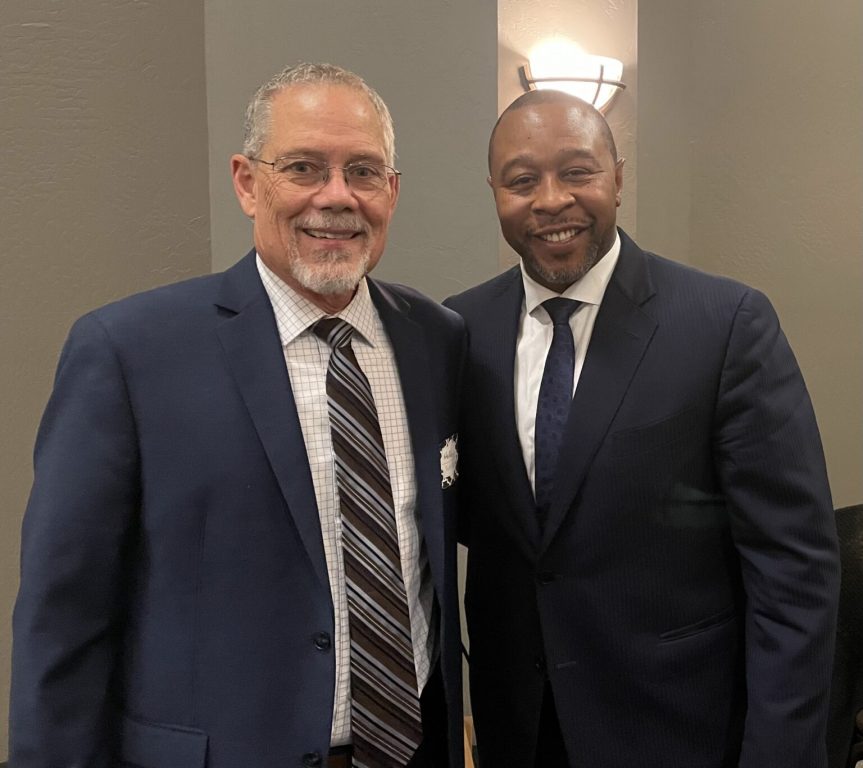Exonerated Prisoners Released Get Little Support in Wisconsin
Parole and probation agents give more help to guilty inmates released from prison.

In November, Wisconsin Innocence Project co-founder Keith Findley (left) spoke about wrongful convictions at an annual banquet in Menasha, Wisconsin organized by the advocacy organization ESTHER. Findley stands next to Jarrett Adams, whom Findley helped free after Adams was sentenced to 28 years in prison. Photo by Andrew Kennard.
The exoneration of David and Robert Bintz in a 1987 murder case has increased attention on what happens in Wisconsin after defendants’ convictions are overturned and they are released from prison.
The Wisconsin Claims Board considers compensation claims by innocent people who were convicted of a crime. The board can award up to $25,000, not including attorneys’ fees, and not more than $5,000 for every year of wrongful imprisonment. It can recommend that the state Legislature award additional compensation.
Re-entering society
Exonerated people often experience more difficulty accessing services to help them reenter society than people who were released on probation or parole, according to Rachel Burg, co-director of the Wisconsin Innocence Project.
State programs work with people on probation or parole before release, Burg said, and include pre-release job training, assistance with applications to public benefits and general release planning. After release, a person may have court or supervision-mandated programs, such as school or work requirements.
“By no means am I saying being on probation or parole is easy or conducive to successfully reentering society, but in theory there is access to resources that are not available to the wrongfully convicted,” Burg said in an email to the Examiner.
Exonerated people don’t have probation officers making sure they have their identification cards and get set up for Medicaid, she said, or parole agents helping with job applications.
A guilty person gets more support from the state than an innocent person who was exonerated, Keith Findley, co-founder of the Wisconsin Innocence Project and an emeritus law professor at UW-Madison, said in an interview in November.
“They’ve spent often decades in prison, had their livelihoods taken away from them, their relationships, their homes, their professions, their good names,” Findley said. “And then when we discover we got it wrong and made a mistake, we just open the door and say, ‘OK, have a good life,’ with nothing more from the state.”
Findley said Wisconsin could create a state forensic science commission, as well as conviction integrity units (CIUs) in prosecutors’ offices. In neighboring Michigan, the CIU in the state attorney general’s office investigates claims of innocence that are accompanied by new evidence.
Paths to compensation
Exonerees in the U.S. may receive compensation through a civil lawsuit, a private bill passed by a state legislature or a state law, if the state has a compensation statute.
Wisconsin’s compensation cap for wrongfully convicted people is one of the lowest caps in the country. The rare exception to the cap is if the Wisconsin Legislature approves a higher amount.
The Wisconsin Claims Board decides whether to grant compensation to an exonerated person and can recommend that the Legislature award an amount higher than the $25,000 cap.
The members of the Wisconsin Claims Board come from the Wisconsin Senate, the Wisconsin Assembly, the governor’s office, the Wisconsin Department of Justice and the Wisconsin Department of Administration. Currently, the legislative representatives are Rep. Alex Dallman (R-Green Lake) and Sen. Eric Wimberger (R-Oconto).
How much does Wisconsin pay wrongly convicted people?
Wisconsin pays an average of about $4,200 per year of wrongful incarceration to those who filed and received compensation, according to an analysis of data collected by the National Registry of Exonerations, Wisconsin Watch reported.
A bipartisan bill that would have increased the $25,000 cap to $1 million passed the Wisconsin State Assembly in 2016, the Capital Times reported. It didn’t become law. The bill would have also granted assistance for transitioning back into society and up to 10 years in the state’s health insurance program for public employees.
There were 39 states, along with the District of Columbia, with compensation statutes for wrongful imprisonment as of March.
Some states’ compensation statutes allow exonerees to receive services, like assistance with tuition, job search and housing, Rachel Burg of the Wisconsin Innocence Project said.
As of July 2023, 62 Wisconsin exonerees were wrongly convicted in state courts since 1989 and potentially eligible for compensation, according to a research paper that used information from the National Registry of Exonerations. Jeffrey Gutman of George Washington University Law School published “Compensation under the Microscope: Wisconsin” in 2022, and it was updated in 2023.
As of July 2023, 25 of the 62 had filed claims. 17 of 25 applicants were granted compensation, and 8 were denied.
Gutman wrote that Wisconsin’s filing rate was significantly below a national average of 58% and said that “Wisconsin’s low compensation is a logical explanation.”
In Findley’s view, Wisconsin’s compensation plan for exonerees “puts a very high burden” on innocent people to prove their innocence.
Wisconsin’s compensation statute does not give compensation to people because they show their conviction was overturned, the claims board said when it denied compensation to Lavontae Stinson in a 2024 decision.
Stinson’s conviction was overturned due to ineffective assistance of his legal counsel, the claims board said. For this to happen, Stinson had to show there was a “reasonable probability” that more effective counsel would have led to a different result.
According to the board’s decision, the Milwaukee County District Attorney decided not to retry Stinson because the state could not meet its burden of proof. According to the DA, additional information from Stinson’s post-conviction counsel “cast some doubt on whether Stinson was involved at all in the crimes for which he was sent to prison.”
To receive compensation, Stinson had to meet a different standard — proving his innocence with “clear and convincing” evidence — and the board ruled his arguments and evidence did not meet the standard.
Rare compensation from the Legislature
In 2014, then-Gov. Scott Walker signed a bill granting Robert Lee Stinson an additional $90,000. In the end, Stinson was awarded the $115,000 he had requested from the Wisconsin State Claims Board — $5,000 for each year of his imprisonment.
Gutman’s “Compensation Under the Microscope” reported 17 cases of exonerees receiving state compensation, going back to 1989. Stinson’s case appeared to be the only example of the Wisconsin Legislature ordering additional compensation for a wrongfully convicted person following a claims board recommendation, he wrote.
Stinson spent over two decades incarcerated for a conviction based on flawed evidence, FOX6 Milwaukee reported. He settled litigation with the city of Milwaukee for $7.5 million.
Jarrett Adams, an attorney working with David and Robert Bintz, didn’t yet know if the brothers could make a claim for a federal lawsuit, he told the Examiner in late February. Wisconsin’s compensation statute might be the brothers’ only opportunity for compensation, he said.
In the case of Daryl Holloway, the claims board recommended an additional $975,000 in March 2022, Gutman wrote, and the Legislature hadn’t acted on the recommendation as of June 2023.
After a 3-2 vote, in a Jan. 30 decision, the board awarded Gabriel Lugo $25,000 in compensation, not including attorneys’ fees.
Lugo had been sentenced to 30 years in prison for a 2008 shooting and released in 2023 after his conviction was vacated. The board recommended that the Legislature award Lugo an additional $750,000.
Exonerees experience gap in support in Wisconsin was originally published by the Wisconsin Examiner.






















Wisconsin’s Criminal Justice is broken. Racial Profiling, with so called ‘War on Drugs’ and inequitable Sentencing are the problem.
Black people are the majority of those wrongly convicted.